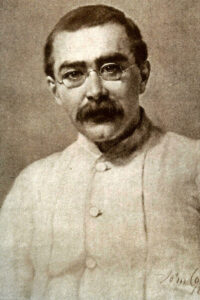
Kim
Kim (Kimball O’Hara) is the orphaned son of an Irish soldier (Kimball O’Hara Sr., a former colour sergeant and later an employee of an Indian railway company) and a poor Irish mother (a former nanny in a colonel’s household) who has both died in poverty. Living a vagabond existence in India under British rule in the late 19th century, Kim earns his living by begging and running small errands on the streets of Lahore.
He occasionally works for Mahbub Ali, a Pashtun horse trader who is one of the native operatives of the British secret service. Kim is so immersed in the local culture that few realise he is a white child, although he carries a packet of documents from his father entrusted to him by an Indian woman who cared for him. Kim befriends an aged Tibetan lama who is on a quest to free himself from the Wheel of Things by finding the legendary ″River of the Arrow″. Kim becomes his chela, or disciple, accompanying him on his journey. On the way, Kim incidentally learns about parts of the Great Game and is recruited by Mahbub Ali to carry a message to the head of British intelligence in Umballa. Kim’s trip with the Lama along the Grand Trunk Road is the first great adventure in the novel.
By chance, Kim’s father’s regimental chaplain identifies Kim by his Masonic certificate, which he wears around his neck, and Kim is forcibly separated from the lama. The lama insists that Kim comply with the chaplain’s plan because he believes it is in Kim’s best interests, and the boy is sent to an English school in Lucknow. The lama, a former abbot, funds Kim’s education. Kim is divided between his love for his Lama master, his eagerness to become a secret agent and even have a price put on his head, and his natural independence as a free spirit. Throughout his years at school, Kim remains in contact with the holy man he has come to love. Kim also retains contact with his secret service connections and is trained in espionage (to be a surveyor) while on vacation from school by Lurgan Sahib, a sort of benevolent Fagin, at his jewellery shop in Simla. As part of his training, Kim looks at a tray full of mixed objects and notes that have been added or taken away. This pastime is still called Kim’s Game, also called the Jewel Game. Other parts of this training are a disguise and the careful study of the Indian population, as well as the characteristic dress, behaviour, and “even how they spit” to go undercover or to discover those in disguise. After three years of schooling, Kim is given a government appointment to begin participating in the Great Game. Before this appointment starts, however, he is granted a much-deserved break.
Kim rejoins the lama, and at the behest of Kim’s superior, Hurree Chunder Mookherjee, they make a trip to the Himalayas so Kim can investigate what some Russian intelligence agents are doing. Kim obtains maps, papers, and other essential items from the Russians, who are working to undermine British control of the region. Mookherjee befriends the Russians undercover, acting as a guide, and ensures that they do not recover the lost items. Kim, aided by some porters and villagers, helps to rescue the lama.
Read or download Book
Rudyard Kipling
Joseph Rudyard Kipling ( 30 December 1865 – 18 January 1936) was an English novelist, short-story writer, poet, and journalist. He was born in British India, which inspired much of his work.
Biography
Kipling’s works of fiction include the Jungle Book duology (The Jungle Book, 1894; The Second Jungle Book, 1895), Kim (1901), the Just So Stories (1902), and many short stories, including “The Man Who Would Be King” (1888). His poems include “Mandalay” (1890), “Gunga Din” (1890), “The Gods of the Copybook Headings” (1919), “The White Man’s Burden” (1899), and “If—” (1910). He is seen as an innovator in the art of the short story.
His children’s books are classics; one critic noted “a versatile and luminous narrative gift”. In the late 19th and early 20th centuries, Kipling was among the United Kingdom’s most famous writers. Henry James said, “Kipling strikes me personally as the most complete man of genius, as distinct from fine intelligence, that I have ever known.” In 1907, he was awarded the Nobel Prize in Literature, as the first English-language writer to receive the prize, and at 41, its youngest recipient to date. He was also sounded out for the British Poet Laureateship and several times for a knighthood, but declined both.
Following his death in 1936, his ashes were interred at Poets’ Corner, part of the South Transept of Westminster Abbey. Kipling’s subsequent reputation has changed with the political and social climate of the age. The contrasting views of him continued for much of the 20th century.
Literary critic Douglas Kerr wrote: “[Kipling] is still an author who can inspire passionate disagreement and his place in literary and cultural history is far from settled. However, as the age of the European empires recedes, he is recognized as an incomparable, if controversial, interpreter of how empire was experienced. That, and an increasing recognition of his extraordinary narrative gifts, make him a force to be reckoned with.”






